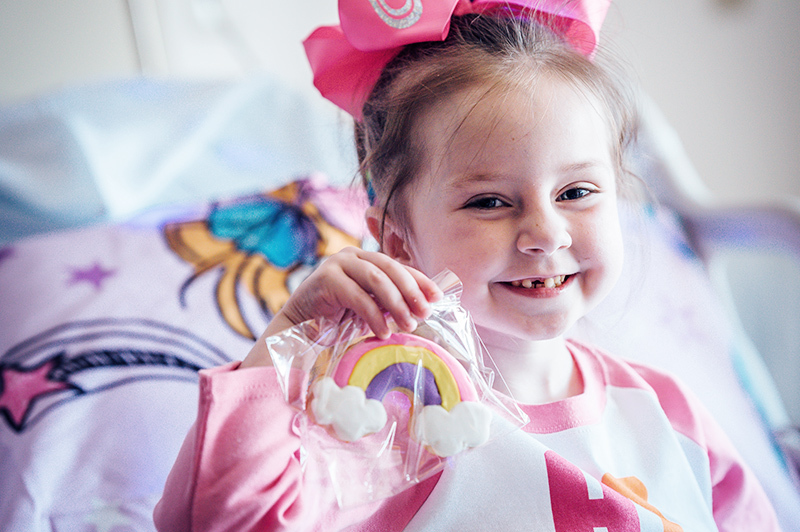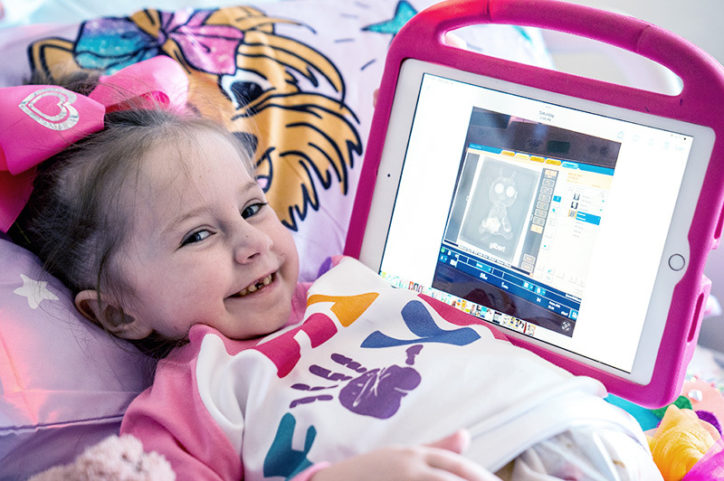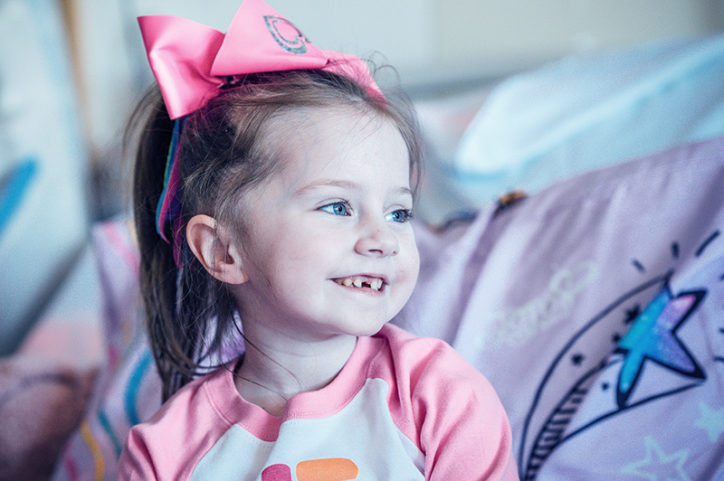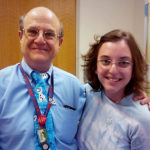‘Life-changing’ appointment helps Georgia cope with motility issues

Five-year-old Georgia MacAloney loves dancing, cheerleading, and riding her bike. “She’s just a happy, regular kid,” says her mother, Justine. “You would never know what she’s been through just by looking at her.”
Yet just a few years ago, the family had put life on hold due to Georgia’s illness. “We didn’t plan trips and were afraid to leave home,” says Justine. “We kept waiting for the other shoe to drop.”
A frustrating journey
The MacAloneys’ journey began soon after Georgia was born. When she didn’t pass her meconium — a newborn’s first stool — and then began vomiting, an X-ray at her birth hospital revealed an intestinal blockage. After being transferred to a neonatal intensive care unit (NICU) in Boston, Georgia was diagnosed with small left colon syndrome, a rare cause of intestinal obstruction that doctors believed would resolve itself.
But Georgia’s symptoms didn’t improve. “We were constantly returning to the hospital, but no one could determine what was wrong,” remembers Justine. She and her husband, Neil, decided Georgia needed more specialized care.

Finally, answers
Within days of her arrival at Boston Children’s Hospital, Georgia was correctly diagnosed with chronic intestinal pseudo-obstruction (CIPO), a rare intestinal disorder that leads to the symptoms of an intestinal blockage — such as pain, vomiting, and bloating — without an actual physical obstruction. She spent more than 100 days in Boston Children’s NICU, underwent an ileostomy, and received most of her nutrition through a G-tube.
Eventually, Georgia and her parents were able to connect with Dr. Samuel Nurko, director of the hospital’s Motility and Functional Gastrointestinal Disorders Center, for a second opinion. That meeting, says Justine, “completely changed our lives.”
‘Go live your lives’
Dr. Nurko conducted motility testing to confirm Georgia’s diagnosis and changed her medications to optimize treatment. Yet Georgia’s frequent hospitalizations and surgeries — upwards of 30 inpatient stays — had made her parents nervous about the future. “We had spent so much time in and out of the hospital that we felt like we were always walking on eggshells,” says Justine.
Whenever she remembers what Dr. Nurko told her next, Justine cries. “He reassured us that she can do anything other kids can do,” she says. “He explained what symptoms we should worry about and which ones we shouldn’t. And he said, ‘Go live your lives. She’ll be okay.’”

A newfound freedom
That encouragement has given the MacAloneys the freedom to make plans with Georgia and their two older children, including family vacations. While Georgia’s condition still brings her to the hospital, her parents have a better handle on when she’s dealing with a minor problem versus something that requires clinical care. And Dr. Nurko and nurse Amy Milligan are always available to help and answer any questions that do arise.
This fall, Georgia started kindergarten — and Justine is reflecting on how much has changed in just five years. “When you’re in the thick of things, it’s so hard to see the positive,” she says. “But other families have been through this and they’re thriving now. And so are we.”
Learn about the Motility and Functional Gastrointestinal Disorders Center or make an appointment.
Related Posts :
-

‘Never stop looking for answers’: Andrea’s journey with dysmotility
As a volunteer at Caritas Internationalis, Andrea Hernandez loves helping feed the hungry. Yet, until recently, Andrea herself was unable ...
-

Taking a leap of faith: Jack says goodbye to his G-tube
As they waited for their son Jack’s appointment, Marika and Josh Reuling had no indication that July 17, 2018, would be ...
-

Interventional pain techniques bring Sadie relief
It’s hard for Sadie Doherty and her parents to remember a time when she hasn’t been in pain. ...
-

Dysmotility may play a major role in respiratory symptoms
Clinicians whose patients exhibit respiratory symptoms frequently assume that gastroesophageal reflux disease (GERD) is responsible. However, esophageal and gastric dysmotility ...





